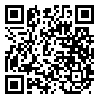Volume 21, Issue 2 (8-2022)
TB 2022, 21(2): 57-72 |
Back to browse issues page
Research code: SDH-9936
Ethics code: IRAJUMS.REC.1399677
Download citation:
BibTeX | RIS | EndNote | Medlars | ProCite | Reference Manager | RefWorks
Send citation to:



BibTeX | RIS | EndNote | Medlars | ProCite | Reference Manager | RefWorks
Send citation to:
Shakerinejad G, zandieh A, sharhani A, Hatamzadeh N, Mazaheri M. Predicting the Determinants of Interpersonal Communication Skills in Healthcare Providers of Ahvaz City: An Application of the Extended Theory of Reasoned Action. TB 2022; 21 (2) :57-72
URL: http://tbj.ssu.ac.ir/article-1-3302-en.html
URL: http://tbj.ssu.ac.ir/article-1-3302-en.html
School of Healt Ahvaz Jundishapur University of Medical Sciences , dalahoo_nh@yahoo.com
Abstract: (575 Views)
Introduction: Communication skills are a set of behaviours through which aperson communicate with others in such a way leading to positive responses and the avoidance of negative responses. This study aims to predict the determinants of interpersonal communication skills among healthcare providers of Ahvaz city based on the extended theory of reasoned action.
Methods: This cross-sectional descriptive study was condcuted on 160 healthcare providers of Ahvaz city in 2021using random sampling. Data collection tool was a researcher-made questionnaire. The data were analyzed by SPSS version 24 and AMOSS version 22 software, using correlation tests, regression analysis, independent samples t-test and paired t-test.
Results: The mean age and work experience of the participants was 35.76± 6.55 and 10.31± 6.79 years, respectively. The results of Pearson correlation indicated a direct and significant correlation between attitude (r = 0.527), subjective norm (r = 0.243), and self-efficacy (r = 0.630) together and with behavioral intention. Among the constructs of the extended theory of reasoned action, self-efficacy (r = 0.630) and subjective norm (r = 0.243) had the highest and lowest correlation with behavioral intention of health care providers, respectively. Furthermore, this theory predicted 0.22 variance of attitude, 0.02 variance of subjective norm and 0.49 variance of self-efficacy. Self-efficacy was the strongest and subjective norms was the weakestpredictors of communications skills behavior, respectively.
Conclusion: According to the results, it seems that in planning to implement behavioural interventions to promote interpersonal communication skills in healthcare providers, more emphasis should be placed on strategies related to increasing attitude, self-efficacy, and behavioural intention.
Methods: This cross-sectional descriptive study was condcuted on 160 healthcare providers of Ahvaz city in 2021using random sampling. Data collection tool was a researcher-made questionnaire. The data were analyzed by SPSS version 24 and AMOSS version 22 software, using correlation tests, regression analysis, independent samples t-test and paired t-test.
Results: The mean age and work experience of the participants was 35.76± 6.55 and 10.31± 6.79 years, respectively. The results of Pearson correlation indicated a direct and significant correlation between attitude (r = 0.527), subjective norm (r = 0.243), and self-efficacy (r = 0.630) together and with behavioral intention. Among the constructs of the extended theory of reasoned action, self-efficacy (r = 0.630) and subjective norm (r = 0.243) had the highest and lowest correlation with behavioral intention of health care providers, respectively. Furthermore, this theory predicted 0.22 variance of attitude, 0.02 variance of subjective norm and 0.49 variance of self-efficacy. Self-efficacy was the strongest and subjective norms was the weakestpredictors of communications skills behavior, respectively.
Conclusion: According to the results, it seems that in planning to implement behavioural interventions to promote interpersonal communication skills in healthcare providers, more emphasis should be placed on strategies related to increasing attitude, self-efficacy, and behavioural intention.
Type of Study: Research |
Subject:
General
Received: 2022/02/2 | Accepted: 2022/08/1 | Published: 2022/08/1
Received: 2022/02/2 | Accepted: 2022/08/1 | Published: 2022/08/1
Send email to the article author
| Rights and permissions | |
 |
This work is licensed under a Creative Commons Attribution-NonCommercial 4.0 International License. |







